
The 1998 Northern Ireland Assembly election took place on Thursday, 25 June 1998. This was the first election to the new devolved Northern Ireland Assembly. Six members from each of Northern Ireland's eighteen Westminster Parliamentary constituencies were elected by single transferable vote, giving a total of 108 Members of the Legislative Assembly (MLAs).
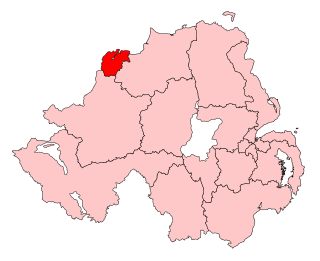
Foyle is a constituency in Northern Ireland represented in the House of Commons of the UK Parliament. Its current Member of Parliament (MP) has been Colum Eastwood of the Social Democratic and Labour Party (SDLP) since 2019.

East Londonderry is a parliamentary constituency in the United Kingdom House of Commons. The current MP is Gregory Campbell of the DUP.

Mid Ulster is a parliamentary constituency in the UK House of Commons. The current MP is Francie Molloy of Sinn Féin.

Fermanagh and South Tyrone is a parliamentary constituency in the British House of Commons. The current MP is Michelle Gildernew of Sinn Féin.

Belfast North is a parliamentary constituency in the United Kingdom House of Commons. The current MP is John Finucane of Sinn Féin.

Belfast South is a parliamentary constituency in the United Kingdom House of Commons. The current MP is Claire Hanna of the SDLP.

North Down is a parliamentary constituency in the United Kingdom House of Commons. The current MP is Stephen Farry of the Alliance Party. Farry was elected to the position in the 2019 general election, replacing the incumbent Sylvia Hermon. Hermon had held the position since being elected to it in the 2001 general election, but chose not to contest in 2019.
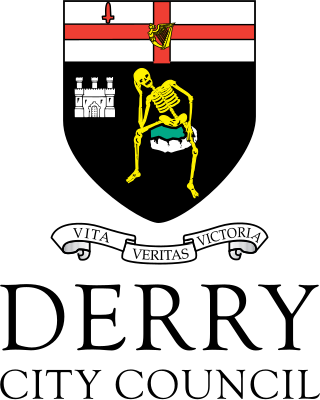
Derry City Council was the local government authority for the city of Derry in Northern Ireland. It merged with Strabane District Council in April 2015 under local government reorganisation to become Derry and Strabane District Council.
The Commonwealth Labour Party (CWLP) was a minor political party in Northern Ireland. The party was founded in 1942 by Harry Midgley, former leader of the Northern Ireland Labour Party (NILP), in order to pursue his brand of labour unionism.
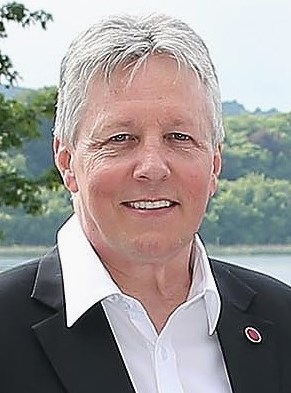
The 2011 Northern Ireland Assembly election took place on Thursday, 5 May, following the dissolution of the Northern Ireland Assembly at midnight on 24 March 2011. It was the fourth election to take place since the devolved assembly was established in 1998.
This is the results breakdown of the 2005 general election.

An election to Londonderry Borough Council took place on Thursday 15 January 1920 as part of that year's Irish local elections.

The 2015 United Kingdom general election in Northern Ireland was held on 7 May 2015 and all 18 seats were contested. 1,236,765 people were eligible to vote, up 67,581 from the 2010 general election. 58.45% of eligible voters turned out, an increase of half a percentage point from the last general election. This election saw the return of Ulster Unionists to the House of Commons, after they targeted 4 seats but secured 2.
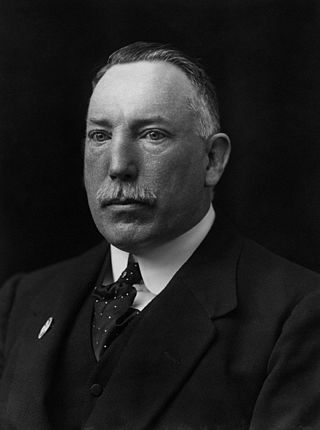
The 1924 Northern Irish local elections were held in January & June 1924 for the various county & district councils of Northern Ireland. The election followed changes by the Unionist government, which had redrawn electoral districts, abolished PR for local elections, and implemented a requirement for members of local authorities to take an oath of allegiance.
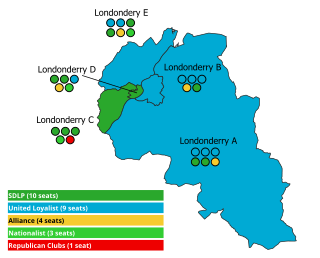
The 1973 Londonderry City Council election took place on 30 May 1973 to elect members of Londonderry City Council in Northern Ireland. This was on the same day as other Northern Irish local elections. The campaign was significant in that, following changes to the election process and districts, Irish nationalist parties were able to take control of the council for the first time.

Elections to Londonderry Borough Council were held on 17 May 1967, amidst the Northern Ireland civil rights movement.

The 2019 United Kingdom general election was held on 12 December 2019 to elect all 650 members of the House of Commons, including 18 seats in Northern Ireland. 1,293,971 people were eligible to vote, up 51,273 from the 2017 general election. 62.09% of eligible voters turned out, down 3.5 percentage points from the last general election. For the first time in history, nationalist parties won more seats than unionist parties.

Local elections were held in Northern Ireland on 18 May 2023. The elections were delayed by two weeks to avoid overlapping with the coronation of King Charles III. Following the elections, Sinn Féin became the largest party in local government for the first time. It also marked the first time that nationalist parties had garnered a greater share of the vote than unionist parties.

















